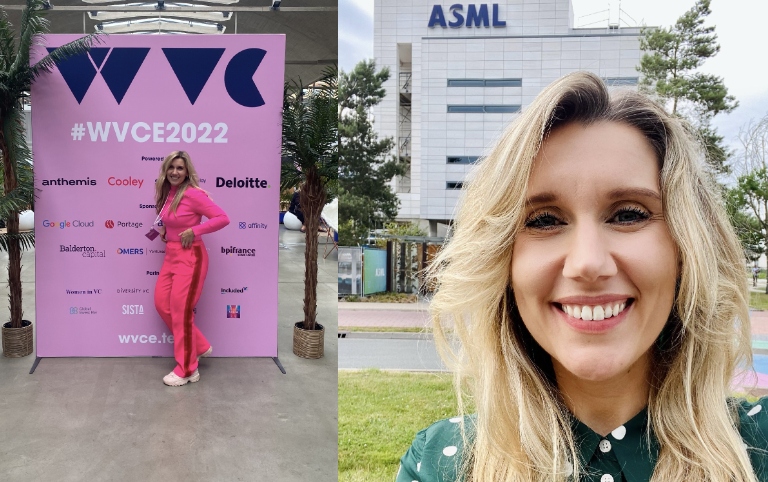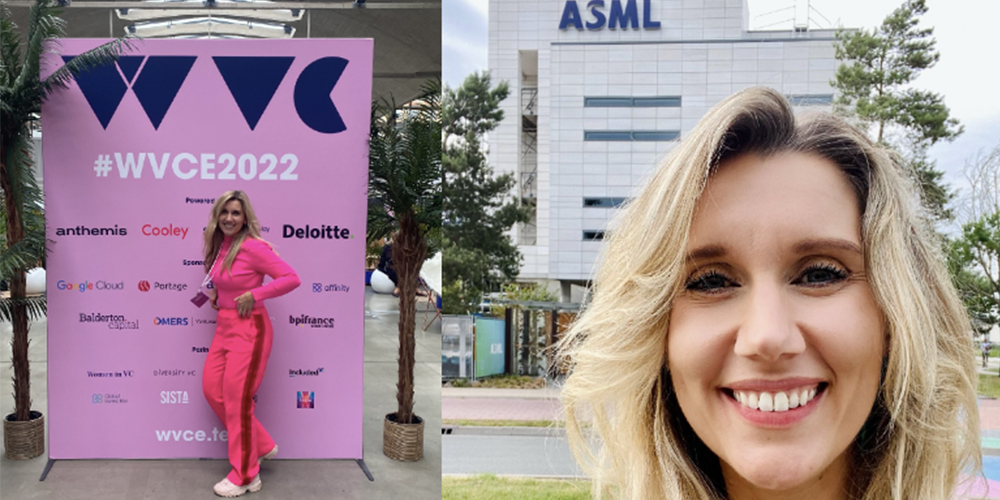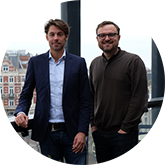Evelien de Vries’ mission within ASML is to support the growth of the deep tech ecosystem. They believe that a thriving deep tech ecosystem benefits society because it fosters innovations that create jobs, improve quality of life from an environmental and social perspective, and secure technical sovereignty. In our chat, find out which advice for founders she shared with us and what she predicts for the ecosystem in the near future.

1. Hi, Evelien. Thank you for agreeing to do the interview. Please tell us about your background connection to the startup world.
After my law degree, I got the opportunity to co-found a startup. We compressed images into tiny files without visible quality loss. We got the first paying company and were gearing up for a funding round. But, as it goes with founding teams, we had to part ways due to misaligned visions. Nevertheless, it was a great learning experience, and I would like to build a company again someday.
At the same time, techleap.nl started as an organization, and I was asked to join them, which I gladly did. I eventually ended up heading the capital team as the Capital Lead, where I worked on closing the funding gaps in the Netherlands, working with startups and all kinds of investors, such as angels, VCs, PE, government, and pension funds, both in the Netherlands as well as Europe and the US.
In this role, I’ve also gotten into contact with ASML, and that’s where I am now.
2. You recently started a new role at ASML, a highly innovative company that manufactures lithography machines used by, for instance, Samsung, TSMC, and Intel to make microchips. Tell us about your mission there.
My mission within ASML is to support the growth of the deep tech ecosystem. We believe that a thriving deep tech ecosystem benefits society because it fosters innovations that create jobs, improve quality of life from an environmental and social perspective, and secure technical sovereignty.
To achieve this, we work together with several actors in the ecosystem, ranging from venture builders and funds – such as HighTechXL and DeepTechXL – but we also support startups directly with in-kind support, where we can provide expertise on how to, for example, industrialize their business model. We are now looking at scaling up, so I’m looking forward to contributing.
3. What’s going well in the startup ecosystem in the Netherlands at the moment? Which challenges is the ecosystem facing? How do you feel you’re contributing?
To avoid repeating what has been said so many times before (the usual topics, e.g., risk averseness, ambition, lack of later-stage capital, not enough investments into deep tech or diverse founders, lack of involvement of pension funds, etc.), I’m going to focus on one topic that I feel we need to talk about more, which is collaboration.
The current global dynamics lead to more protectionism between different continents and countries. This also has (and will continue to have) an effect on the startup ecosystem. For example, it will be more difficult for certain kinds of companies to attract investments, because not every investor is allowed to invest due to regulations. This ultimately means that the Dutch startup ecosystem does not have the luxury to only focus on (the interests of) its own country (or even its own region!), but needs to collaborate with Europe a lot more. This goes from exchanging knowledge, access to launching customers and investing capital, to creating attractive exit opportunities.
Therefore, to make the Dutch ecosystem successful, where innovations can scale and ultimately improve quality of life (globally), we need to think bigger – yes, quoting the report from my great former colleagues at Techleap here – but I also would like to add “together.”
As “collaborate” is one of our values at ASML, we always look at ways to work together more.
4. You mentioned you’re a former founder yourself. Which advice would you give to startup founders looking to grow and scale internationally?
As a founder, I’ve had a lot of “advice” from people with no experience. This advice was often not the best. But maybe I can share one observation after four years of working with all kinds of investors and founders: the importance of doing due diligence as a founder on an investor just like an investor does DD on your company.
For starters, make sure you know how a VC firm works, what LPs are, and what deployment periods are, for example. The more knowledge you have on this, the better you know what motivates the VC. Take the topic of return on their investment. Do they want you to deliver a unicorn or even a 10x unicorn? And do you want that too? Because that is a massive feat that requires 24/7 dedication and also some luck. Also, make sure you ask the investor if it’s okay to call some portfolio companies beforehand, so you know how this investor is through good and bad times.
5. What do you predict for the ecosystem in the Netherlands in the near future?
I think the startup ecosystem in the Netherlands will only continue to grow. I feel there is a lot of momentum and energy among the founders and investors. For example, I love that more and more exited founders start angel investing, getting a flywheel spinning. However, to keep this growth going, we all need to step it up and think bigger together, as I previously mentioned. This includes founders, investors, and the government. They are sitting on some key pieces, such as further improving the ESOP scheme and consolidating funding and regulation, which can spur further growth. We are capable of much more; I can’t wait to see this.
Thank you very much for sharing your story and insights, Evelien. We wish you the best of luck in your future endeavors.
Join our network of startups & investors!


